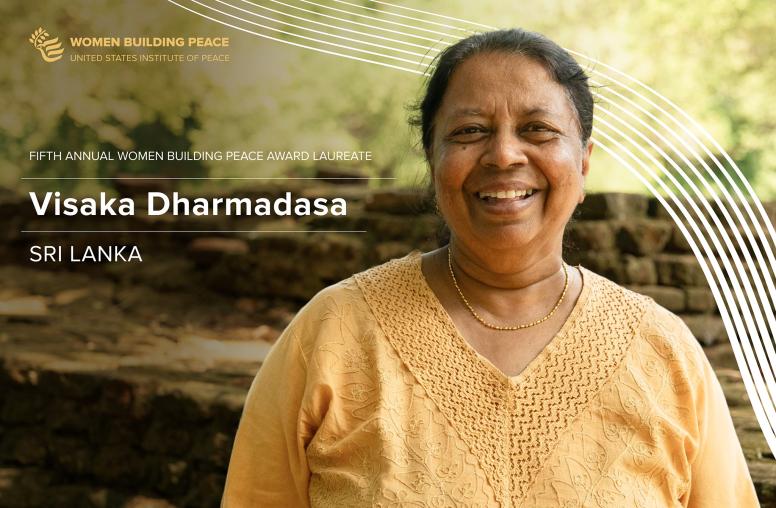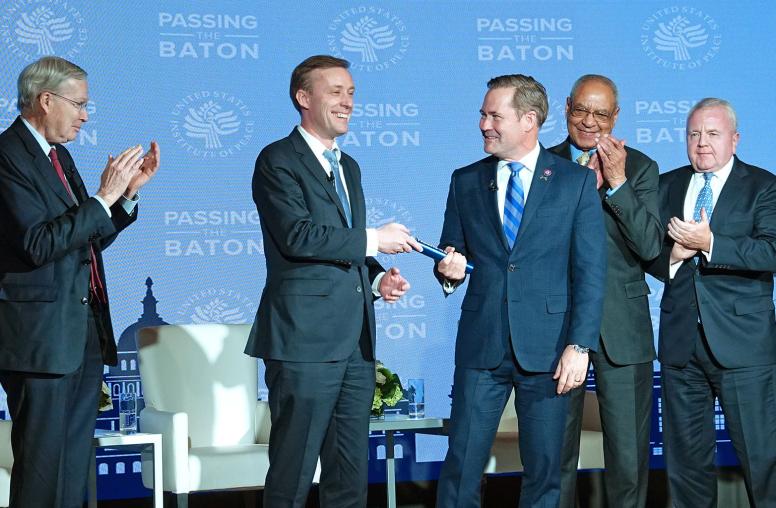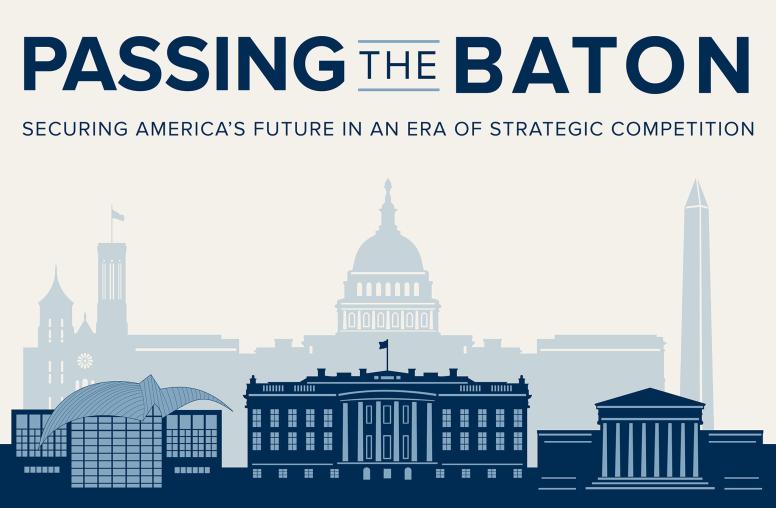USIP Iraq Programs Make Significant Security Contributions
Petraeus testimony calls Iraqi security 'uneven', but Institute is filling important gaps Increased focus on community-level peacebuilding efforts crucial for a less 'fragile' Iraq
Institute Experts Available to Speak about Iraq Programs/Petraeus-Crocker Testimony*
FOR IMMEDIATE RELEASE - April 8, 2008
Contact:
| Ian Larsen +1-202-429-3870 cell +1-202-657-7327 |
Lauren Sucher +1-202-429-3822 cell +1-202-657-7326 |
General David Petraeus called Iraq's security situation 'uneven' in testimony before the Senate Foreign Relations Committee today, saying significant gains made in the last year are 'fragile and reversible'. Addressing the country's remaining security gaps by pursuing peacebuilding at the national, provincial, and neighborhood level will be a crucial part of building a sustainable peace, says the U.S. Institute of Peace (USIP), which has led successful peacebuilding programs on the ground in Iraq since 2004.
"Sustained effort is required not just at the national level, but also at the provincial and local level," says Patricia Thomson, USIP Executive Vice President. "We work at all three levels, and we work in partnership with Iraqis, the U.S. military, State, and USAID."
"Iraqis need to build institutions and processes that will allow them to deal with conflict through non-violent means," says Daniel Serwer, USIP Vice President for Post-Conflict Peace and Stability Operations and head of the Institute's Iraq programs. "Building relationships that cross sectarian lines, increasing government capacity, strengthening the rule of law, and crafting a wide-reaching accommodation among Iraq's leading political actors are all essential to a lasting, stable peace."
The projects listed below are examples of USIP's work in Iraq since 2004. In each case, these civilian-led projects have made lasting contributions toward a more stable Iraqi society.
Community Level
Iraqi Facilitators Network
In 2004, USIP trained several dozen Iraqi conflict resolution facilitators to be the core of a network that conducts its own training programs, maps fault lines within Iraqi society, and mediates local conflicts. Since then, these facilitators have engaged in more than 80 peacebuilding projects, working at the local level to strengthen cross-sectarian and inter-religious relationships, and to help resolve conflicts.
Members of the facilitators' network have been responsible for declines in violence in many of the areas in which they have worked.
Leveraging this success, USIP has committed to training and supporting 100 additional facilitators in the short term.
The Mahmoudiya Peacebuilding Model
Mahmoudiya, a mixed Sunni-Shia district of approximately 500,000 people just south of Baghdad, has witnessed horrific violence since 2003. In October, USIP convened a conference of 31 tribal sheikhs from Mahmoudiya (two-thirds Sunni and one-third Shia) who signed a path-breaking signed statement (PDF - 30KB) committing themselves to bringing security to Mahmoudiya and to improving the quality of life of its citizens. With USIP support, a local NGO is now overseeing implementation of the plan in cooperation with the local government.
As a result, the Iraqi High Judicial Council agreed to send a circuit judge to provide oversight and to hear cases throughout Mahmoudiya, and in early 2008, Sunni tribal sheikhs involved in the conference agreed to rebuild a Shia mosque in Mahmoudiya destroyed by violence.
The Hotspots Initiative
USIP is supporting a Hotspots Initiative to combat sectarianism through grassroots action in Iraq’s most violent provinces. The Hotspots Initiative is still in its early stages but preliminary results are promising. A pilot program began in Kirkuk, which, because of its diversity and large oil reserves, has the potential to be the “hottest” of Iraq’s provinces. Hotspots workshops were attended by a broad ethnic and religious cross-section of Kirkuk society. Participation by Kirkuk youth, essential to long-term peacebuilding, was particularly strong.
Iterative Peacebuilding Initiative
USIP also piloted its Iterative Peacebuilding Initiative in Kirkuk. This initiative brought together 36 community leaders for a series of intensive training programs. The initiative had three objectives: increasing conflict management skills, building relationships across ethnic lines, and promoting follow-on peacebuilding projects. Participants came from Kirkuk's three major Muslim ethnic groups (Arab, Kurd, and Turkoman), as well as the small Assyrian Christian ethnic group.
Participants also represented six sectors: religious leaders, business leaders, civilian political figures, security sector leaders, civil society leaders, and journalists. The program successfully strengthened relationships and resulted in a number of important, and still active, local projects. It will be replicated in other provinces in 2009.
National Level
National Dialogue Initiative
USIP is committed to a new national dialogue with wide participation. To this end, in 2006 USIP convened with the United Nations the first serious discussion among Sunni politicians and scholars (including "rejectionists") about how to pursue constitutional and legislative interests through political means.
This dialogue resulted in a list of Sunni priorities that has helped guide ongoing constitutional deliberations, as well as bring many of the disenfranchised into the political process. USIP is now engaging with leading politicians to promote a reinvigorated national dialogue on how the country should be governed and power distributed.
Regional Dialogue
Stepped-up regional engagement—as advocated by the Iraq Study Group—is also essential to Iraqi stability, as well as a more stable regional order. Recognizing this, USIP worked with foreign policy and national security experts from Iraq and its six neighbors to craft the Marmara Declaration—a blueprint for regional stabilization. USIP is now supporting two follow-on Track 2 mediation efforts, one among religious leaders and another among media leaders from Iraq and its neighbors.
These mutually reinforcing dialogues, within and outside Iraq, help to generate the kind of solidarity that is necessary to stabilize the country and enable U.S. troops to withdraw as soon as possible.
Rule of Law
USIP has a wide range of projects dedicated to strengthening the rule of law in Iraq. Early USIP efforts focused on Iraq's constitution. The Institute funded the public outreach unit of the committee charged with drafting the constitution and sponsored hundreds of working sessions involving tens of thousands of individuals.
USIP also provided expert advice to the Iraqi parliamentary committee for constitutional review, as well as support to the Iraqi Committee on Judicial Independence (ICJI), a consortium of representatives from the Iraqi government and legal community.
The ICJI has also been successful in promoting modifications to the Iraqi constitution that will strengthen the independence of the Iraqi judiciary.
Government Coordination
To be effective civil servants and to overcome sectarian and ethnic divisions, Iraqi officials need training in negotiation, coalition-building, and planning. They must also develop the skills necessary to address a broad range of political, security, social, and economic problems. The Institute is running week-long training programs, enabled by sophisticated computer-supported simulations, to build these skills.
Nearly 800 Iraqis have been served, with very positive results. The Iraqis involved consistently report that the experience is extremely useful, typically rating it 9 on a 10-point scale.
* The following USIP experts are available to speak about USIP's programs in Iraq and/or today's Petraeus-Crocker testimony. Please contact Ian Larsen or Lauren Sucher to schedule a time:
Patricia Thomson, Executive Vice President
Daniel Serwer, Vice President, Center for Post-Conflict Peace and Stability Operations
Paul Hughes, Senior Program Officer, Center for Post-Conflict Peace and Stability Operations
Rusty Barber, Chief of Party, Iraq
Sam Parker, Program Officer, Iraq
Jason Gluck, Rule of Law Advisor
Rend al-Rahim, Senior Fellow



